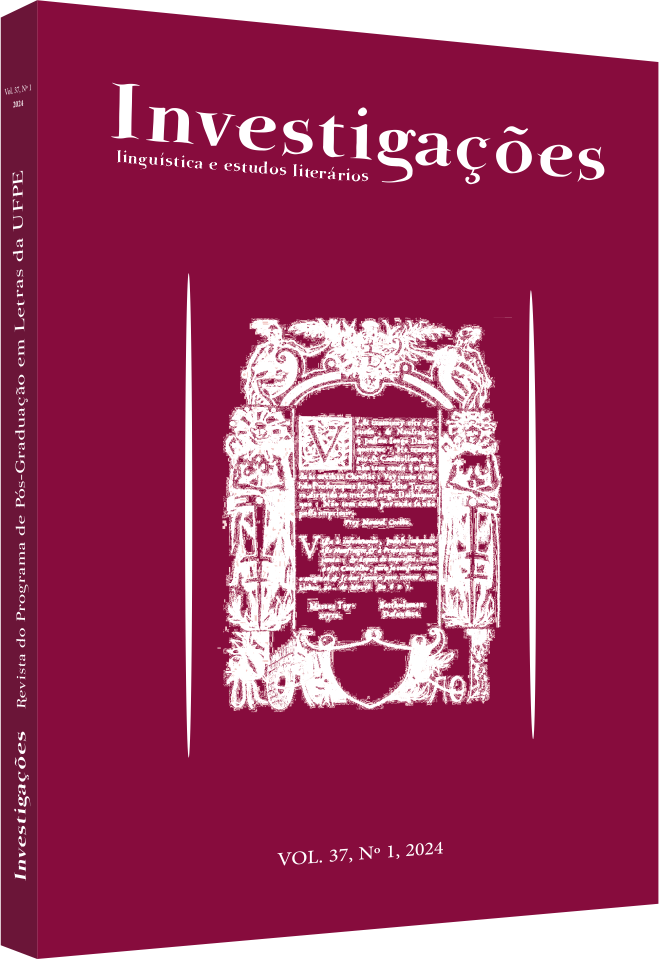Octavia Butler: subverter of stereotypes, creator of worlds and of herself
DOI:
https://doi.org/10.51359/2175-294x.2024.258411Keywords:
Octavia Butler, science fiction, Kindred, memoryAbstract
Octavia Butler is considered the first black woman science fiction author in the United States. Her writing is marked by themes of power and Black protagonists that embody bodies rarely seen in science fiction until then. This article aims to discuss Butler's trajectory, her role in literature, and specifically how she addresses issues of memory and racist stereotypes in Kindred (2019). It also intends to observe how Butler was able to use literature and the art of writing to explore the potentialities of existence, starting with her own.
References
ASSMANN, Aleida. Espaços de Recordação. Campinas: Editora da Unicamp, 2011.
BEAULIEU, Elizabeth Ann. Writing African American Women: an encyclopedia of literature by and about women of color. Londres: Greenwood Press, 2006.
BUTLER, Octavia. Black women and the science fiction genre. The Black Scholar, São Francisco, v. 17, n. 2, p. 14-18, mar. 1986.
BUTLER, Octavia E. Kindred – Laços de Sangue. São Paulo: Morro Branco, 2017.
BUTLER, Octavia. E. A Parábola dos Talentos. São Paulo: Morro Branco, 2019.
BUTLER, Octavia E. Filhos de Sangue e Outras Histórias. São Paulo: Morro Branco, 2020. 240 p.
DAVIS, Angela. Mulheres, Raça e Classe. São Paulo: Boitempo, 2016.
EVARISTO, Conceição. Literatura negra: uma poética de nossa afro-brasilidade. Scripta, [s. I.], v. 13, n. 25, p. 17-31, dez. 2009. ISSN 2358-3428. Disponível em: http://periodicos.pucminas.br/index.php/scripta/article/view/4365/4510. Acesso em: 9 jun. 2019.
HALL, Wiley. Featured in stories that they rarely write. The Evening Sun, Baltimore, 30 de maio de 1980.
hooks, bell. Olhares negros: raça e representação. São Paulo: Elefante, 2019a.
hooks, bell. E eu não sou uma mulher?. Rio de Janeiro: Rosa dos Tempos, 2019b.
JARDIM, Suzane. Reconhecendo estereótipos racistas na mídia norte-americana. 2016. Disponível em: https://medium.com/@suzanejardim/alguns-estere%C3%B3tipos-racistas-internacionais-c7c7bfe3dbf6. Acesso em: 17 nov. 2019.
KENAN, Randall. An Interview with Octavia E. Butler. Callaloo, Baltimore, v. 14, n. 2, p. 495-504, abr. 1991.
PERROT, Michelle. Minha história das mulheres. São Paulo: Contexto, 2019.
RANCIÈRE, Jacques. A partilha do sensível. 2. ed. Rio de Janeiro: Editora 34, 2009.
Times Colonist 01 Mar 2006, page 54. Disponível em: https://www.newspapers.com/image/509380264. Acesso em: 3 out. 2023.
STEWART, Jocelyn. Wrote about race in sci-fi. The Gazette, Montreal, 1º de março de 2006.
VINT, Sherryl. "Only by Experience": Embodiment and the limitations of Realism in neo-slave narratives. Science Fiction Studies, [s. l.], v. 34, n. 2, p. 241-261, jul. 2007.
Downloads
Published
How to Cite
Issue
Section
License
Copyright (c) 2024 Camile Fernandes Borba

This work is licensed under a Creative Commons Attribution 4.0 International License.
Authors who publish with Revista Investigações agree to the following terms:
Authors retain copyright and grant the journal right of first publication with the work simultaneously licensed under the Creative Commons Attribution 4.0 International (CC BY 4.0) license that allows others to share the work with an acknowledgement of the work's authorship and initial publication in this journal.
Authors are able to enter into separate, additional contractual arrangements for the non-exclusive distribution of the journal's published version of the work (e.g., post it to an institutional repository or publish it in a book), with an acknowledgement of its initial publication in this journal.
You are free to:
Share — copy and redistribute the material in any medium or format for any purpose, even commercially.
Adapt — remix, transform, and build upon the material for any purpose, even commercially.
The licensor cannot revoke these freedoms as long as you follow the license terms.
Under the following terms:
Attribution — You must give appropriate credit , provide a link to the license, and indicate if changes were made . You may do so in any reasonable manner, but not in any way that suggests the licensor endorses you or your use.
No additional restrictions — You may not apply legal terms or technological measures that legally restrict others from doing anything the license permits.

